
 Hello and welcome to the unofficial Brian De Palma website. Here is the latest news: |
|---|
E-mail
Geoffsongs@aol.com
-------------
Recent Headlines
a la Mod:
Listen to
Donaggio's full score
for Domino online
De Palma/Lehman
rapport at work
in Snakes
De Palma/Lehman
next novel is Terry
De Palma developing
Catch And Kill,
"a horror movie
based on real things
that have happened
in the news"
Supercut video
of De Palma's films
edited by Carl Rodrigue
Washington Post
review of Keesey book
-------------
Exclusive Passion
Interviews:
Brian De Palma
Karoline Herfurth
Leila Rozario
------------
------------
| « | August 2010 | » | ||||
| S | M | T | W | T | F | S |
| 1 | 2 | 3 | 4 | 5 | 6 | 7 |
| 8 | 9 | 10 | 11 | 12 | 13 | 14 |
| 15 | 16 | 17 | 18 | 19 | 20 | 21 |
| 22 | 23 | 24 | 25 | 26 | 27 | 28 |
| 29 | 30 | 31 | ||||
De Palma interviewed
in Paris 2002
De Palma discusses
The Black Dahlia 2006

Enthusiasms...
Alfred Hitchcock
The Master Of Suspense
Sergio Leone
and the Infield
Fly Rule
The Filmmaker Who
Came In From The Cold
Jim Emerson on
Greetings & Hi, Mom!
Scarface: Make Way
For The Bad Guy
Deborah Shelton
Official Web Site
Welcome to the
Offices of Death Records
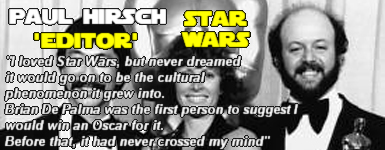 Last week, Dennis Pellegrom at Star Wars Interviews posted an interview with Paul Hirsch, who, along with fellow editors Marcia Lucas and Richard Chew, won an Oscar for his work on George Lucas' Star Wars. In the first section of the interview, Hirsch explains the series of events that led to his working on Star Wars:
Last week, Dennis Pellegrom at Star Wars Interviews posted an interview with Paul Hirsch, who, along with fellow editors Marcia Lucas and Richard Chew, won an Oscar for his work on George Lucas' Star Wars. In the first section of the interview, Hirsch explains the series of events that led to his working on Star Wars:Later, Pellegrom asks Hirsch what he thought of the film while working on it, and whether he ever might have guessed that the film would be such a success and that he would win an Oscar for it. "I loved it," replies Hirsch, "but never dreamed it would go on to be the cultural phenomenon it grew into. Brian De Palma was the first person to suggest I would win an Oscar for it. Before that, it had never crossed my mind."
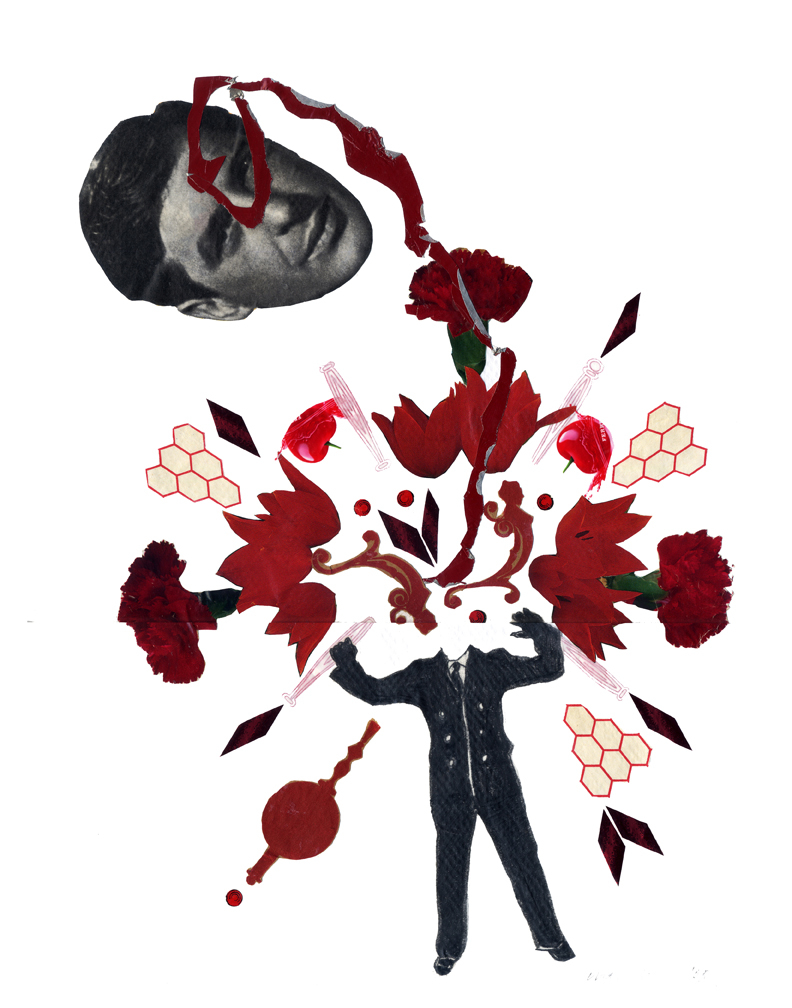
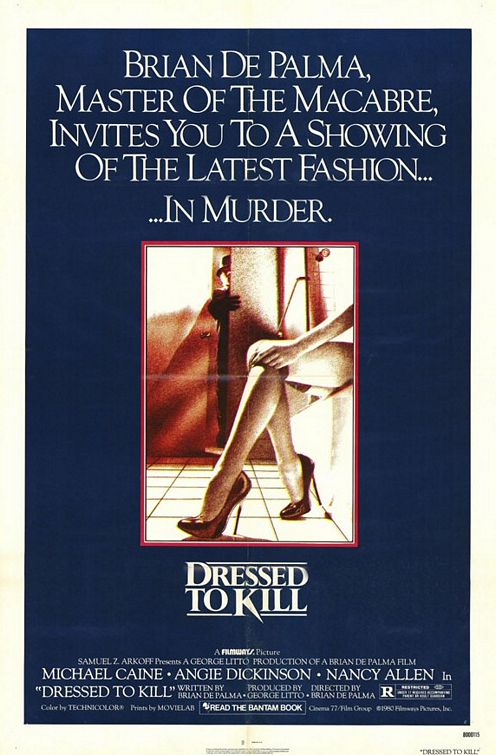 Matt Zoller Seitz and company at Salon invited 15 writers and filmmakers to recall "the movie experience I can't forget." Odienator (aka Odie Henderson) recalls his "lenient" aunt taking him and his two cousins to see Brian De Palma's Dressed To Kill when he was just ten years old. They were all expecting a typical horror movie by the guy who did Carrie and The Fury. "It was supposed to be an innocent time at the movies, full of violence we knew wasn't real and scares we could tolerate," writes Odienator. "It all started at the beginning," he continues a bit later...
Matt Zoller Seitz and company at Salon invited 15 writers and filmmakers to recall "the movie experience I can't forget." Odienator (aka Odie Henderson) recalls his "lenient" aunt taking him and his two cousins to see Brian De Palma's Dressed To Kill when he was just ten years old. They were all expecting a typical horror movie by the guy who did Carrie and The Fury. "It was supposed to be an innocent time at the movies, full of violence we knew wasn't real and scares we could tolerate," writes Odienator. "It all started at the beginning," he continues a bit later..."Jesus Christ!" said my aunt, a little louder than before.
The movie went on, and by my aunt's silence, I deduced there was nothing objectionable occurring. What also wasn't occurring was the violence one would find in a horror movie. After a seemingly interminable silent pursuit sequence in a museum, which seemed creepy but had no scary payoff, Policewoman entered a New York City cab and proceeded to engage with her co-star from the museum sequence. I had no idea what they were doing (I was 10), but it sure looked interesting. Suddenly, I felt my aunt grabbing my arm. She dragged me and my two cousins out of the theater, an angry look on her reddened face. "Come on, we're going!" she yelled.
"What's wrong, Mom?!" my cousin asked.
"There is too much fucking fucking in this movie!" she explained. "Y'all can't watch this!"
(See the slide show at Salon for Odienator's full write-up.)
SCARFACE, OPENING NIGHT 1983 IN BOSTON
There are more moments being shared in the article's comments section. "NHBill" wrote about seeing Scarface on opening night:
My wife and I, two of the Whitest people you will ever meet, Conan O'Brien White, decided to head Downtown for Dinner and a movie. It was a date night for my wife but for me it was the chance to see the new Brian De Palma film "Scarface" on opening night. I am an enormous De Palma fan. Even his failures are fascinating to me. The audience for this screening to my everlasting gratitude was predominately Black. They loved Scarface. Particularity finding all of the humor and irony in Al Pacino's performance. We screamed in laughter when Pacino dove head first into a mountain of cocaine and moments later when he invited us to "Say hello to my little friend." We were all shocked and thrilled at the violence. But I was surprised how many reviewers did not find "Scarface" the least bit amusing! Every one of us leaving that theater knew we has [sic] seen an instant classic, the ultimate roller coaster ride laughing one minute shocked in horror the next. Scarface is not my favorite film. It's not even my favorite De Palma film but it was the best film going experience of my life thanks to that fantastic audience!
CARRIE SCARED HER TWICE
A letter to Salon from Robbins Read delves into several theater experiences, including this one regarding De Palma's Carrie:
“Carrie”: The first time I saw it, there was a collective gasp from the theater audience and maybe a scream or two when the hand comes out of the gravesite. I remember that I gripped my armrests tightly. When I saw it a week or two later with my cousin, the same collective gasp occurred, and he was holding my wrist tightly. And even though I knew what was coming, I was scared again!
(Thanks to Rado!)

However, Kirk Honeycuty at the Hollywood Reporter, who calls the film's style "juvenile," wonders whether anybody outside the Comic-Con and youth crowd will care. "The movie does everything its makers can dream up to imitate a manga," writes Honeycutt. "Screens split in half and then in half again. Action speeds up or slows down. Comic-book word sounds — “whoosh,” “r-i-i-i-i-n-g,” “thud” and the like — pepper the screen. Backstories about exes are told in rudimentary sketches. The movie frame becomes a graffiti zone where the filmmakers can insert all sorts of written commentary including the fact that a character has to pee. How edifying is that?" Variety's Peter DeBruge echoes Honeycutt's view. "An example of attention-deficit filmmaking at both its finest and its most frustrating," writes DeBruge, "Scott Pilgrim vs. the World blends the styles of videogames, sitcoms and comicbooks for a mostly hollow, high-energy riff on the insecurities of young love. With Michael Cera in the title role, twentysomethings and under will swiftly embrace this original romancer, which treats the subject as if there were nothing more important in all the universe, though anyone over 25 is likely to find director Edgar Wright's adaptation of the cult graphic novel exhausting, like playing chaperone at a party full of oversexed college kids." Despite this, DeBruge concedes that the film is "a feat of economical storytelling, rendered in the vernacular of small talk and text messages." And on the subject of the film's many many characters, DeBruge writes, "The fact that we can keep all these characters straight while intuitively following the movie's unique vidgame logic is a testament to Wright's never-dull directorial skills."
Techland's Lev Grossman, acknowledging the hype that goes with being "pampered" at a surprise screening, calls the film "beautiful," saying that the film's real star is the director. "Practically every frame has a visual or auditory gag in it," writes Grossman, "goofing on eight-bit games and rock cliches and action movies. (The characters are always trying to do snappy banters in fight scenes, then getting confused and having to explain the joke.) Nothing ever comes at you straight. Some of this stuff is lifted from the book, but some are Wright's own riffs -- at one point, when Scott and Wallace are hanging out in their apartment, Wright starts dropping in Seinfeld music and a laugh track behind the actors, and the scene turns into a dead-on parody of a sitcom. For maybe 20 seconds. How Wright keeps this stuff coming for an entire movie is beyond me."
Cinematical's Todd Gilchrist sees the film as a cultural benchmark that will divide critics, although he himself is quite taken with it. "As far as deadpan hipster comedies are concerned," writes Gilchrist, "Scott Pilgrim is the Godfather of the genre – a massive, sprawling epic that builds and builds while offering just enough ironic asides to make fully sure that no one involved is taking themselves too seriously." Gilchrist adds that, "Cinematically, director Edgar Wright continues to grow by leaps and bounds with each film, and here his mastery of technique pioneered by others finally and firmly becomes its own style." However, Gilchrist feels that Wright's rapid pacing may rub some the wrong way. "Wright's breakneck editing and pacing makes Michael Bay look positively pastoral by comparison, and it's probably here where Scott Pilgrim may suffer from many of its most passionate criticisms. I was certainly never lost in the filmmaking flourishes, even when Wright would cut breezily through several locations over the course of a single conversation, or chop up the action into bits so fine they looked almost like the ones and zeroes that provided the animators with their raw materials. But this is resolutely a film for a generation of moviegoers that is acclimated to music video-era storytelling, one less interested in formalism (much less classicism) than the sum total of a scene's emotional weight or energy, and it may turn off folks who want something that's subtler, more reflective, or even just a little slower."
 SciFi Universe's Romain B. and Richard B. got a chance to sit down with Nancy Allen at this year's Neuchâtel International Fantastic Film Festival in Switzerland, where Allen was a member of the international jury. They've posted a video of the interview, and also a text transcript. Allen balked when the interviewers suggested that she plays essentially the same character in two films she made back-to-back with her then-husband Brian De Palma, Dressed To Kill and Blow Out:
SciFi Universe's Romain B. and Richard B. got a chance to sit down with Nancy Allen at this year's Neuchâtel International Fantastic Film Festival in Switzerland, where Allen was a member of the international jury. They've posted a video of the interview, and also a text transcript. Allen balked when the interviewers suggested that she plays essentially the same character in two films she made back-to-back with her then-husband Brian De Palma, Dressed To Kill and Blow Out:Allen further talked about how she became involved in Blow Out, which she says was originally written for older actors:
I was not going to make that movie, Blow Out. I was never supposed to make that movie. In fact, in the original script, the characters were written very differently. They were really written for two older people who were kind of broken down, and, you know, cynical, and just older, and really had been through a lot. And there was a list of actors, more like, um, James Woods, or more of like an intellectual kind of actor. And John [Travolta] just happened to call. I was in Paris, and I was there doing press for Dressed To Kill. And Brian says, “Oh, John Travolta called, and he wanted to read my new script.” And I said, “Well, what are you going to do if he likes it?” [Laughing] Because it was not written for… And he said, “Oh, no, no, it’s not for him. He won’t like it.” So sure enough, he liked it, and I said, “Well, now what are you going to do? Are you going to tell him no?” And he said, “Well, no, I can’t do that. It changes the whole movie.” And I said, “Well, you know, he’s totally wrong for this character. I don’t know what you’re doing.” So I was arguing with him. And he says, “Oh, you think so? Well, he wants to do it with you! Now what do you think?” And I said, “Well, I say yes! Of course I’m going to do it.” So then because it was so different with the two of us, we started to do improvisation to try and now find these new characters. So we worked all these improvisations, and then Brian rewrote the script so it was fitting more to John and I.
As the interview continues, Allen explains how the whole idea of her character wanting to do make-up was something that just popped into her head while doing the improvisations with Travolta. She also confirms to the interviewers that it really is her scream at the end of Blow Out.
(Thanks to Screenfreekz!)
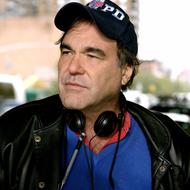 While in London to promote his new Hugo Chavez documentary South of the Border, Oliver Stone talked with Total Film and planted the suggestion of a sequel to Scarface, which Brian De Palma directed from Stone's screenplay. "It’s been great to go back with Wall Street: Money Never Sleeps," Stone told the magazine. He then added, "I should go back and do Son of Scarface or something!" While Stone's comment appears to be off-the-cuff, it could also indicate that he is indeed seriously considering the idea. He could even be throwing the idea out there to see how people react, and to see whether anybody would be interested in financing it. A son of Tony Montana could belong to Elvira, even though her womb is "so polluted," Montana did not believe he could have a kid with her. But a son could also be the offspring of Montana's sister, Gina, and her husband Manny, also Tony's best friend... who Tony, of course, murdered in a blind rage.
While in London to promote his new Hugo Chavez documentary South of the Border, Oliver Stone talked with Total Film and planted the suggestion of a sequel to Scarface, which Brian De Palma directed from Stone's screenplay. "It’s been great to go back with Wall Street: Money Never Sleeps," Stone told the magazine. He then added, "I should go back and do Son of Scarface or something!" While Stone's comment appears to be off-the-cuff, it could also indicate that he is indeed seriously considering the idea. He could even be throwing the idea out there to see how people react, and to see whether anybody would be interested in financing it. A son of Tony Montana could belong to Elvira, even though her womb is "so polluted," Montana did not believe he could have a kid with her. But a son could also be the offspring of Montana's sister, Gina, and her husband Manny, also Tony's best friend... who Tony, of course, murdered in a blind rage.
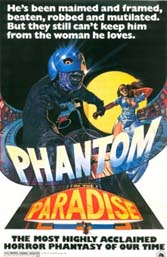 Landmark's Bridge Theatre in San Francisco is in the midst of a midnight movie series called "Rocksploitation," where rock-n'-roll themed movies are preceeded by the band Citizen Midnight, "cinema’s most obnoxiously amazing rock ‘n’ roll band," according to the website. This Saturday, Brian De Palma's Phantom Of The Paradise will play. The price is $10 for the whole show.
Landmark's Bridge Theatre in San Francisco is in the midst of a midnight movie series called "Rocksploitation," where rock-n'-roll themed movies are preceeded by the band Citizen Midnight, "cinema’s most obnoxiously amazing rock ‘n’ roll band," according to the website. This Saturday, Brian De Palma's Phantom Of The Paradise will play. The price is $10 for the whole show.
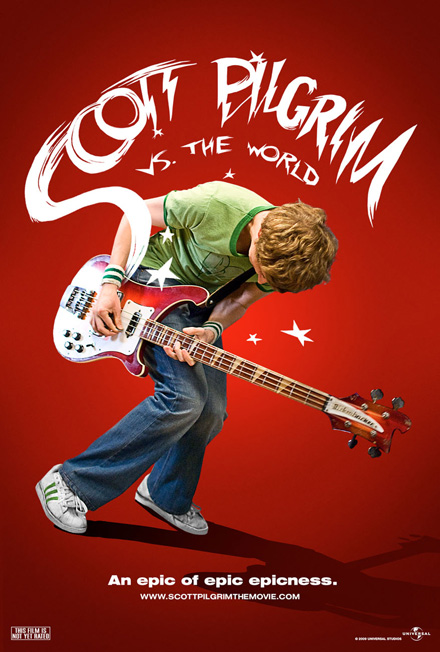 In a great interview with Film Journal International's Ethan Alter, Edgar Wright states that his upcoming adaptation of Bryan Lee O'Malley's graphic novel series, Scott Pilgrim vs. The World (which is actually the title of just one of the books in the series), is "a film that isn’t quite like anything else." The way Wright actually wanted to describe it to Hollywood studios would have thrown them off, he says. "In Hollywood," he told Alter, "they always encourage you to say a film is like X-meets-Y, so I always came up with some kind of bullshit for those meetings. Things like 'It's Cameron Crowe meets Five Deadly Venoms' or 'It's Ferris Bueller meets Kill Bill.' Actually, I always wanted to say that it's like Kung Fu Hustle meets Phantom of the Paradise, but if I had, people would have been like, 'Wait, what?'"
In a great interview with Film Journal International's Ethan Alter, Edgar Wright states that his upcoming adaptation of Bryan Lee O'Malley's graphic novel series, Scott Pilgrim vs. The World (which is actually the title of just one of the books in the series), is "a film that isn’t quite like anything else." The way Wright actually wanted to describe it to Hollywood studios would have thrown them off, he says. "In Hollywood," he told Alter, "they always encourage you to say a film is like X-meets-Y, so I always came up with some kind of bullshit for those meetings. Things like 'It's Cameron Crowe meets Five Deadly Venoms' or 'It's Ferris Bueller meets Kill Bill.' Actually, I always wanted to say that it's like Kung Fu Hustle meets Phantom of the Paradise, but if I had, people would have been like, 'Wait, what?'"Wright also enthuses to Alter about his friendships with Quentin Tarantino and Joe Dante. "Meeting these guys is one of the most amazing things that's happened to me in my life," he told Alter. "You could pretty much learn everything about film history by talking with Quentin and Joe for a couple of hours. Between the two of them, you've got two walking cinema encyclopedias, Joe for the ’50s and ’60s and Quentin for the ’70s and ’80s. I always say that the two of them should go on a college tour together—maybe with Martin Scorsese as well."